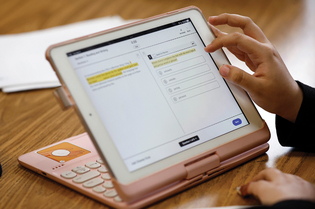
AP Photo/Butch Dill
A student takes a practice test to prepare for the digital SAT. Yale College will again require applicants to submit standardized test scores, but they may choose from several tests.
View full image
Standardized scores are making a comeback. Beginning this fall, Yale College will again require prospective students to submit standardized test scores along with their applications—though with a key difference from the pre-COVID era: applicants to the class of 2029 will now be able to submit their AP or International Baccalaureate scores in lieu of SAT or ACT scores. Although a few other schools in the Ivy League (Brown, Dartmouth, and Harvard as of press time) will again require either SAT or ACT scores, only Yale has opted to be “test flexible” for all students.
“During our four years of considering roughly half of our applicants without ACT or SAT scores, we found that subject-based exams such as AP and IB can add valuable evidence to our committee discussions, just as ACT and SAT do,” Yale admissions dean Jeremiah Quinlan ’03 told YaleNews in February. He noted that “we also have new data from the Office of Institutional Research on the predictive power of these exams.”
Critics have long voiced concerns about the role of standardized testing in admissions, questioning whether requiring scores puts lower income students—who are less likely to have access to test prep—at a disadvantage. Quinlan has said test scores can actually enhance these students’ applications. “Tests can highlight an applicant’s areas of academic strength, reinforce high school grades, fill in gaps in a transcript stemming from extenuating circumstances, and—most importantly—identify students whose performance stands out in their high school context.”
Like colleges across the country, Yale went “test optional” in 2020, as the pandemic drove much of the world into lockdown. Applicants could submit test scores but didn’t have to. As a result, the admissions office now has data on applicants who did and didn’t supply their scores. “The past four years have shown that Yale’s thoughtful whole-person review process is by no means dependent on standardized test scores, but inviting students to apply without any scores can inadvertently disadvantage some applicants,” says Quinlan. “Our research indicated that the shift in emphasis that application readers made when reviewing files without test scores had the unintended effect of advantaging the advantaged.”
Yale applications have spiked since the college stopped requiring standardized tests—from 35,000 applicants in 2019 to more than 57,000 this past year. What happens next? Quinlan says there are “simply too many forces and unknowns at play” for him to speculate on whether applications will go up, down, or sideways. Still, he says his hope is that “this policy encourages prospective students to be thoughtful about applying to Yale, with an understanding that every successful Yale application demonstrates that the student is prepared to succeed in Yale’s rigorous liberal arts program.”
 loading
loading